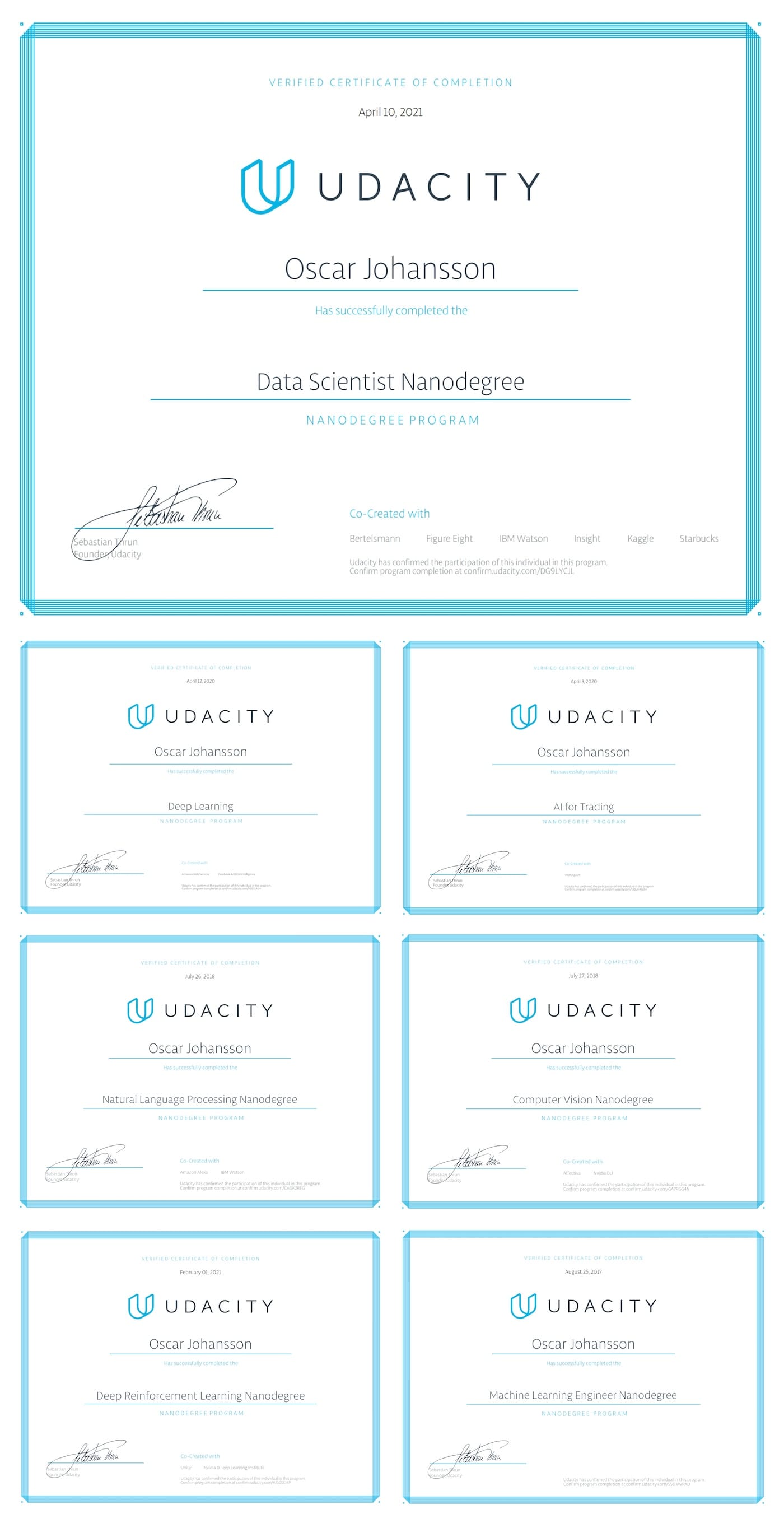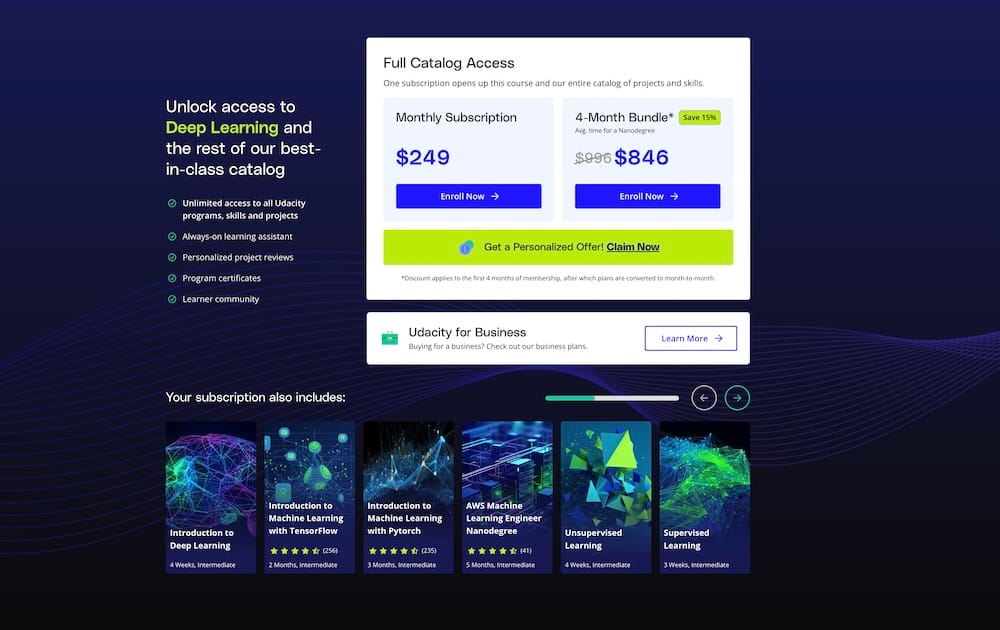My Review of Udacity After Completing 7 Nanodegrees

Introduction
Hello, and welcome to my Udacity review, where I will tell you exactly what I think about this popular technology-focused learning platform.
Background
University was never for me, and I've dropped out of five different degrees. Many people like me that doesn't mean I dislike learning. In fact, learning is one of my primary passions, but I learn through hands-on practice, discussions, books, and online courses.
Many people like me love to learn but don’t thrive in traditional education. Those who are also excited about technology have probably heard about Udacity.
Since I’ve paid for and completed 7 Udacity Nanodegrees, I wanted to share my experiences by writing a review.
Table of Content
- The Udacity Nanodegrees I Have Completed
- What is Udacity?
- What can you study on Udacity?
- Is Udacity worth it?
- Conclusions
The Udacity Nanodegrees I Have Completed
Before we start reviewing Udacity, I want to tell you which Nanodegree I’ve paid for and completed. I have specific reviews for a few of them.
- Data Scientist Nanodegree (review)
- Deep Learning Nanodegree (review)
- AI for Trading Nanodegree (review)
- Natural Language Processing Nanodegree
- Computer Vision Nanodegree
- Machine Learning Nanodegree
- Deep Reinforcement Learning Nanodegree

As you can see, I’ve focused on programs related to machine learning, but I’ve also done the first terms in a few other programs, such as the Robotic Software Engineer and Blockchain Developer Nanodegrees.
What is Udacity?
Udacity is a learning platform that creates high-quality courses on in-demand technologies. It’s the go-to website for many people who want to add a new skill to their toolbelt. According to the website, their mission is to:
"Upskill talent for the careers of the future"
If you compare Udacity’s mission to other platforms, they focus more on preparing their students for a particular role, while competitors such as Coursera want to democratize traditional education.
That’s a big difference, but they’re still competing for the same customers.
Udacity Nanodegrees
The paid programs on Udacity are called Nanodegrees, each teaching you an in-demand tech skill. In all of them, Udacity collaborates with a leading technology company to create the best online course on that particular subject.
The programs take around three months, but you can complete them faster. It took me one month when I studied daily, but I had experience in most subjects.
Who creates the content?
The primary difference between Udacity and its competitors is that Udacity doesn’t outsource content creation to universities or individuals. Instead, they create and update courses themselves.
With fewer programs to maintain, Udacity can ensure that each program competes for the top spot in its category.
Creating and maintaining content yourself doesn’t scale as well as outsourcing, but Udacity has proven that it works just as well. Consequently, they have far fewer programs than Coursera or Udemy, but quantity is not their priority.
What can you study on Udacity?
Udacity divides its courses into nine "schools": Artificial Intelligence, Autonomous Systems, Business, Cloud Computing, Cybersecurity, Data Science, Executive Leadership, Programming, and Product Management.
I’ve only participated in programs from the school of artificial intelligence and the school of programming, so I haven’t experienced the teachers from other programs.
The most popular nanodegrees
Many programs are new or recently updated. Therefore, it’s hard to say which ones are the most popular right now. According to current ratings and reviews at the time of this writing, these are some of the most appraised nanodegrees:
- Android basics by Google
1700 reviews with an average of 4.8 - Intro to programming
1800 reviews with an average of 4.7 - Deep Learning
1600 reviews with an average of 4.7 - Android developer by Google
1100 reviews with an average of 4.7 - Digital marketing
1050 reviews with an average of 4.7 - Data Analyst
1600 reviews with an average of 4.6
If you’re interested in a new program that doesn’t have ratings and reviews yet, I wouldn’t worry too much. Just make sure to read the syllabus to see that it covers the topics you want to study.
Free courses
There are also free courses, but they are not as in-depth as the Nanodegrees. Most of them are either introductions to a subject or deep dives into a narrow skill.
The free courses are good introductions to Udacity as a learning platform and are perfect for people who don’t want to purchase a Nanodegree right away.
If you keep a tight budget, start with a free course.
Why do I keep coming back?
The reason I'm a returning customer is the quality of the content. I’ve realized that what I learned on Udacity tends to stick longer than what I learned from other sources.
They present concepts in a visual way that suits me. They’ve also spent many hours perfecting knowledge delivery to make sure that it’s easy to grasp.
Also, the format of having many short videos is perfect for someone with a short attention span like me. I’ve never had the patience for school because I can’t concentrate for more than 20 min without a break.
To me, Udacity is a cost-effective way to learn a new skill. However, you won’t become good by only doing a Nanodegree. Whatever Nanodegree you pick, you need to add your own deliberate practice as well.
Teachers & Support
There are many great teachers on Udacity presenting the content, but some are better than others. I’ve certainly been disappointed with some parts of a Nanodegree because I didn’t like the presenter.
Is Udacity Worth It?
Most people reading a review of Udacity want to know if it’s a good investment. Unfortunately, it's not that easy to tell. Udacity courses cost more than most other online programs, and their affordability depends on your learning style and financial situation.
If you're a visual learner who wants beautifully produced videos, Udacity is the platform for you. They can invest more into each video compared to other platforms.
Pricing
Currently, enrolling costs $249 per month, but you get access to their entire catalog. That's a serious price for many people around the world and not something that everyone can afford.
If you can't spend $249 a month on online education, don't worry. Udacity is only one alternative, and even though their content is excellent, it's far from mandatory.
Deliberate practice far outweighs the importance of any online course when learning a new skill, and that's free.
Personal discounts
You can get a discount on your first month of learning. So to get the most from your investment, clear your calendar, go to Udacity, grab the discount, and finish the course in a month.
Also, after you finish a Nanodegree, you continue to have access to the content even after you cancel your subscription.

You can also purchase a 4-month bundle to get a 15% discount.
Conclusions
To finish this Udacity review, let’s summarise what we’ve learned.
- Udacity is a premium platform that specializes in teaching in-demand tech skills like machine learning.
- They create the content themselves, and quality is their main competitive advantage.
- You can learn the same skills for less money. However, if the price isn’t an issue, it’s a great alternative.
I hope this post was helpful to you. If you have any questions, don’t hesitate to contact me.





